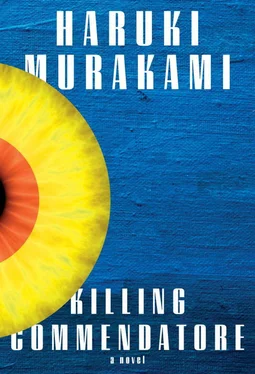In the end, though, I couldn’t paint a thing. No matter how long I stood in front of the canvas and stared at that white, blank space, not a single idea of what to paint came to me. I had no clue where to begin, how to start. Like a novelist who has lost words, or a musician who has lost his instrument, I stood there in that bare, square studio, at a complete loss.
I’d never felt that way before, not ever. Once I faced a canvas, my mind would immediately leave the horizon of the everyday, and something would well up in my imagination. Sometimes it would be a productive image, at other times a useless illusion. But still, something would always come to me. From there, I’d latch onto it, transfer it to the canvas, and continue to develop it, letting my intuition lead the way. If I did it that way, the work completed itself. But now I couldn’t see anything that would provide the initial spark. You can have all the desire and ache inside you want, but what you really need is a concrete starting point.
—
I would get up early in the morning (I generally always wake before six), brew coffee in the kitchen, and then, mug in hand, pad off to the studio and sit on the stool in front of the canvas. And focus my feelings. Listen closely to the echoes in my heart, trying to grasp the image of something that had to be there. But this always ended in a fruitless retreat. I’d try concentrating for a while, then plunk down on the studio floor, lean back against the wall, and listen to a Puccini opera. (I’m not sure why, but all I seemed to listen to then was Puccini.) Turandot , La Bohème . I’d sit there, staring at the languidly rotating ceiling fan, waiting for an idea or motif to come to me. But nothing ever came. Just the early-summer sun that rose sluggishly in the sky.
What was the problem? Maybe it’s because I’d spent so many years doing portraits for a living. Maybe that diminished any natural intuition I had. Like sand slowly washed away by the tide. Somehow the flow of my life had gone off in the wrong direction. I needed time, I thought. I had to be patient. Make time be on my side. Do that, and I was sure to seize the right flow. That channel would surely come back to me. Truthfully, though, I wasn’t sure it ever would.
It was during this period, too, that I slept with the two married women. I think I was looking for some kind of inner breakthrough. Come what may, I wanted to break out of the rut I was in, and the only way for me to do so was to jolt my psyche, give it a prod (it didn’t matter what kind). Plus I’d started to tire of being alone. And it had been a long time since I’d slept with a woman.
—
It occurs to me now that my days back then were pretty strange. I’d wake up early, go into that small square, white-walled studio, have no ideas for what to paint as I stared at the blank canvas, then flop down on the floor and listen to Puccini. When it came to the realm of creativity, I was basically facing a pure nothingness. When Claude Debussy had writer’s block while composing an opera, he wrote, “Day after day I produce rien —nothingness.” That summer was the same for me—day after day I took part in producing nothingness . Perhaps I was quite used to facing nothingness day after day—though I wouldn’t go so far as to say we were intimate.
About twice a week in the afternoon, the second of the married women would drive to my place in her red Mini. We’d go straight to bed and make love. In the early afternoon we’d devour each other’s flesh. What this produced was, of course, not nothingness. No doubt about it, actual flesh-and-blood bodies were involved. Bodies you could actually touch with your hands, every inch, even run your lips over them. In this way, as if I’d flipped a switch on my consciousness, I began moving between an ambiguous, vague rien and a vivid, living reality. The woman said her husband hadn’t made love to her in nearly two years. He was ten years older than she was, and busy with work, never returning home until late at night. She tried many ways of enticing him, but nothing seemed to rouse his interest.
“I wonder why. I mean, you have such a lovely body,” I said.
She gave a small shrug. “We’ve been married over fifteen years and have two kids. I guess I’m no longer as fresh as I used to be.”
“You seem plenty fresh to me.”
“Thanks. Though that makes it sound like I’m being recycled or something.”
“Like recycling resources?”
“Exactly.”
“It’s a very precious resource, though,” I said. “Contributes to society, too.”
She giggled. “As long as you sort everything correctly.”
A little while later, we eagerly set out to sort out resources once more.
—
Truthfully I wasn’t all that drawn to her as a person at first. In that sense there was a different tone about our relationship than with the women I’d dated. She and I had almost nothing in common to talk about. There was hardly anything about our present lives, or our personal histories until then, that overlapped. I’m not generally a talkative person, so when we were together, she did most of the talking. She’d tell me personal things and I’d make the appropriate responses, giving my feedback, I guess you’d call it, though it was hardly a real conversation.
This was a first for me. With other women, I’d always been attracted to their personalities. Physical relationships came later, something that accompanied the initial appeal… That was the usual pattern. But not with her. With her the physical came first. Not that I’m complaining. When I was with her I could enjoy the act in a pure, unfettered way. And I think she could, too. She came many times as we made love, and I came many times too.
She told me this was the first time since she got married that she’d slept with another man. I had no reason to doubt her. And for me, too, this was the first time I’d slept with another woman since I got married. (No, actually there was one exception, when I shared a bed with another woman. Not that it was something I was looking for. I’ll get into that later on.)
“But my friends the same age, all of them are married but most of them are having affairs,” she said. “They talk about it a lot.”
“Recycling,” I said.
“I never imagined I’d join them.”
I gazed up at the ceiling and thought about Yuzu. Was she off somewhere, in bed with somebody?
—
After the woman left, I felt at loose ends. The bed still showed the hollows where she had lain. I didn’t feel like doing anything, so I lay out on a lounge chair on the terrace and killed time reading a book. All the books on Mr. Amada’s bookshelf were old, among them a few unusual novels that would be hard to get hold of these days. Works that in the past had been pretty popular but had been forgotten, read by no one. I enjoyed reading this kind of out-of-date novel. Doing so let me share—with this old man I’d never met—the feeling of being left behind by time.
As the sun set, I opened a bottle of wine (drinking wine was my one and only luxury at the time, though of course this was inexpensive wine) and listened to some old LPs. The record collection was comprised entirely of classical music, the majority of which was opera and chamber music. All of them looked like they’d been lovingly cared for, without a single scratch. During the day I listened to opera, while at night I favored Beethoven and Schubert string quartets.
Having a relationship with that older married woman, being able to hold a real live woman in my arms regularly, brought me a certain level of calm. The soft touch of a mature woman’s skin eased the pent-up emotions I’d had. At the very least, while I made love to her I was able to shelve the doubts and problems I’d been carrying around. Yet I still wasn’t able to come up with an idea of what to paint. Occasionally in bed I’d do a pencil sketch of her in the nude. Most of these were pornographic. Pictures of my cock inside her, or her sucking me off. The sketches made her blush, but she enjoyed looking at them. I imagine that if these had been photos most women wouldn’t have liked them, and would even have been disgusted with the man who made them, and on their guard. But I found that with rough sketches, if they were done well, women were actually happy to see them. Because they had the warmth of life in them—or, at least, they didn’t have a mechanical coldness. But still, no matter how well I managed these sketches, not even a fragment of an image of what I really wanted to paint came to me.
Читать дальше











